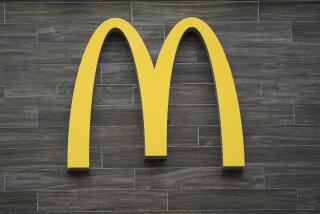THE DOUGLAS FACTOR : Company Still Faces Hard Fight : Aerospace: A Taiwan partnership would beef up McDonnell’s financial muscle, but analysts expect it to lag behind Boeing and Airbus Industrie for much of the 1990s.
- Share via
McDonnell Douglas’ deal to sell Taiwan Aerospace up to 40% of its commercial aircraft business will boost sales from an estimated $7 billion this year to $10 billion by the middle of the 1990s, when the new partnership will be producing the MD-12 jetliner, the St. Louis-based company projected on Wednesday.
Although the Taiwan venture may improve the bleak outlook for McDonnell’s Long Beach-based commercial unit, it is unlikely to launch it very quickly over its heavyweight competitors Boeing and Airbus Industrie. Even if McDonnell achieves all of its goals, a brutal fight looms in a business with too much global manufacturing capacity and with many ailing airlines too weak to buy new aircraft.
McDonnell Executive Vice President John Wolf said Wednesday that the company is actively seeking orders for the MD-12 from Asian airlines but acknowledged that the firm has not yet received any orders or other types of purchase commitments for the $125-million aircraft.
The Taiwan deal will allow the firm to significantly cut its $2.6-billion debt, lower its production costs by 30% and boost its overall share of the business by allowing it to offer more aircraft models, he said. Without the Taiwanese money, Wolf said the company could not afford the $4-billion to $5-billion development cost.
Yet catching Boeing will be a tall order for the firm’s new Pacific Rim consortium, even if things work well. Boeing is expected to post commercial aircraft sales of $29 billion in 1991 and is anticipating enormous growth based on its record backlog of $91.4 billion.
Airbus Industrie, the European consortium whose new aircraft orders have overtaken McDonnell in recent years, does not publish sales figures; but based on its deliveries and estimated aircraft prices, it will post sales of $11 billion in 1990, industry sources said.
McDonnell hopes that by broadening its line of aircraft with the MD-12 and a new jet produced in Mainland China, known as the MD-95, it can offset the increasing strengths Boeing and Airbus have shown this year.
Through the end of October, Boeing took orders for 194 aircraft, or 58% of the world market, against McDonnell’s 33 aircraft for 10% of the market and Airbus’ 92 aircraft and 28% of the market.
Industry analysts were mixed in their reaction to the deal. The agreement will help McDonnell Douglas in the short-run by cutting debt, but the company may not acquire additional market share as a result, said Gary Reich, an analyst at Shearson Lehman Bros. in New York.
“I don’t think this will make McDonnell Douglas more competitive,” Reich said. “There is an educated work force in Taiwan, but it’s not clear the Taiwanese can make (commercial) aircraft parts. In terms of efficiency, I’m not sure (shared production) will work as planned.”
But George Podrasky, an analyst at Duff & Phelps, said the deal will give McDonnell Douglas a strategic boost.
“It will make them a stronger competitor in commercial aircraft and allow them to proceed with MD-12,” Podrasky said. “The labor costs in Taiwan will be substantially lower than the costs at their Long Beach operation, which will help them in their competition with Boeing.”
Critics of the McDonnell deal worry about the potential for McDonnell to transfer valuable American technology to Taiwan. But Taiwan Aerospace already has recruited several key experts from American aerospace programs, including a 22-year veteran of the U.S. space program, David Huang, who will be the venture’s chief executive. The venture’s president will be Denny Ko, a Caltech engineer. Its chief engineer will be Siong Chu, a former U.S. government aerospace researcher.
In outlining details of the Taiwanese agreement that was announced Tuesday, Wolf said Douglas Aircraft would transfer about 36,000 employees to the new international aircraft venture, which has not yet been given a name, leaving about 7,000 workers on the C-17 program in the original Douglas Aircraft Co.
The company would use much of the $2-billion payment from Taiwan Aerospace to cut its debt, Wolf said, a disclosure that prompted Standard & Poor’s Corp. to place McDonnell on its credit-watch surveillance with “positive implications.”
Wolf said McDonnell hopes to formally launch development of the MD-12 by the middle of 1992. But even if the program does not win orders, McDonnell will go ahead with the Taiwanese sale. Once launched, the MD-12 engineering effort would create 3,000 jobs in Long Beach, up to 10,000 new jobs at a new U.S. assembly plant outside of California and several thousand jobs in Taiwan, where the aircraft’s fuselage and wings would be produced, Wolf said.
But the company will cut production of MD-80s by 29% next year, and Wolf said net employment in Long Beach would fall next year. He did not offer details of how big the layoffs will be, but he added that “we have no intention of shutting down Long Beach. We are at full capacity.”
Wolf said 29% of Taiwan Aerospace will be held by the Taiwan government, but he left open the possibility that the government share could dramatically grow as the new venture’s need for capital increases. To finance the MD-12, the operation will draw funds from the existing MD-80 and MD-11 jetliner programs, borrowings and various incentives granted by U.S. cities vying for the new MD-12 assembly plant.
Wolf said Taiwan can take up to a 40% stake in McDonnell’s commercial aircraft segment but would be expected to take no less than 25%. Up to another 9% of the firm would be offered to other partners, including those in Japan, South Korea, Indonesia, Malaysia and Singapore.
Congressional sources said Japan already may have a preliminary agreement on involvement in the new venture, but McDonnell Douglas spokesman Michael Burch denied that either McDonnell or Taiwan Aerospace has any such agreement.
The Capitol Hill sources said company Chairman John McDonnell personally said in more than one meeting with members of Congress that Mitsui Trading Co. would be an investor in the new venture, holding about 5% of the stake in Taiwan Aerospace. Burch said John McDonnell never made such a statement.
The congressional sources also disclosed that John McDonnell told of an unannounced strategy in his Taiwan deal--to grab enough of the Asian market to discourage Japan from even entering the aircraft business. Japanese firms, led by Mitsubishi Heavy Industries, have gained an increasing foothold in aerospace, producing about 20% of Boeing’s newest jetliner, the 777.
Congressional reaction to McDonnell’s Taiwanese sale has been sharp and quick--30 senators signed a letter to President Bush asking him to intercede in the deal and find alternative U.S. investors. Wolf said the firm tried to find American investors, but none were interested.
The company is doing everything it can to quash the public policy debate before it gains any steam, congressional and financial analysts said Wednesday. Almost everybody expects the deal to receive no significant opposition.
Some McDonnell employees, meanwhile, believed that the Taiwan deal would be good for the company, but they still had misgivings.
“It is a good thing for the company, but it is bad for the workers and for the United States,” said Randy Mittan, a Douglas worker. “It shouldn’t have come down to this.” He blamed the government in part by saddling McDonnell with money-losing contracts that have now driven work overseas.
Jeff Hults, another Douglas worker, said: “It is a bad idea. The biggest mistake of all is that we are going to have technology exchanged that will later be used to compete against us. But Americans think short term.”
Times staff writers George White in Los Angeles and Douglas Frantz in Washington contributed to this story.
RELATED STORY: A1
A New Flight Plan
Highlights of the Deal
McDonnell Douglas and Taiwan Aerospace Corp. have a tentative agreement under which the Taiwanese firm will acquire a portion of the U.S. firm’s commercial transport business. Here are some of the major provisions of the agreement:
* McDonnell Douglas will spin off its Long Beach-based commercial aircraft business, which accounts for about 25% of its revenues, into a new company.
* Taiwan Aerospace and its investors will pay McDonnell Douglas $2 billion for a 40% interest in this new company.
* McDonnell Douglas will retain the majority interest and management control of the new company. The parties intend to conclude a definitive agreement by Jan. 31, 1992.
* The new company will build state-of-the-art facilities in the United States and Taiwan for production of the new long-range widebody MD-12 airliner. Significant parts fabrication and major sub-assembly work will be done in Taiwan, with final assembly at a yet-to-be determined new site in the United States.
Commercial Aircraft Orders in 1990
Worldwide market shares
Boeing: 47.1%
Airbus Industrie: 31.8%
McDonnell Douglas: 14.9%
Fokker: 3.6%
British Aerospace: 2.6%
Source: Shearson Lehman Bros.
The McDonnell Douglas Commercial Fleet
The twin-engine MD-80, in service since 1980, is an updated version of the DC-9 and seats 145 to 150 passengers. A more advanced twin-engine plane, the MD-90, is scheduled to go into service in 1994.
The three-engine MD-11, designed for medium- and long-range flights, is an updated version of the DC-10 and has been in service since late last year. It seats 323 passengers in its basic version.
The proposed three-engine MD-12, an improved version of the MD-11, will carry 375 passengers and have a range of 8,000 nautical miles, allowing it to challenge the Boeing 747 for intercontinental routes.
More to Read
Inside the business of entertainment
The Wide Shot brings you news, analysis and insights on everything from streaming wars to production — and what it all means for the future.
You may occasionally receive promotional content from the Los Angeles Times.











